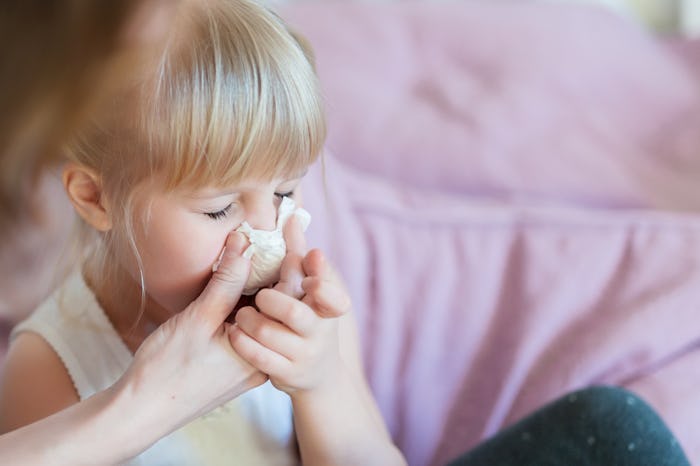Life
Allergy Season Is Going To Be Particularly Severe This Year & Here's What Parents Need To Know
If your child has been rubbing their eyes and acting crabby lately, you might be considering an earlier bedtime. Something that may not have occurred to you was to check the pollen count. Parents of kids with allergies need to be on the lookout this year, because thanks to climate change, our weather is more bonkers than ever, and that's making the trees attack allergy sufferers worse than they're used to.
Throughout spring, summer, and fall, different types of plants drop their pollen. Trees come first, typically in March and April, followed by grasses in May, June, and July, and finally, weeds. But plants need adequate light, warm temperatures, and a good breeze in order to send their pollen flying into our eyes and noses, and even though there was plenty of sunlight in early spring, unseasonably cold temperatures in many parts of the country kept the trees from spreading their yellow sneeze dust, according to The Boston Globe. Now, we're experiencing a warm-up, so all that pollen is getting released in a giant burst all at once, rather than small amounts over a longer period of time. As temperatures continue to fluctuate, plants will keep on saving up until that one perfect day, then dropping the bomb.
"It's going to be a pretty severe year," Dr. Maria Castells, an allergist and immunologist at Brigham and Women's Hospital, told the Globe. There have already been several pollen bursts during the scattered warmer days Boston's experienced, but still, Castells said, "There is a lot of pollen from the trees that have not been released and will continue to be in the air." Keep an eye on those forecasts, and any time the temperature reaches the 60s, you can expect more tree pollen. And if you or your child are allergic to both tree pollen and grass pollen, you've probably already done the math. You're getting a double dose for the next few weeks.
People in Washington D.C. are feeling the effects, as well. They, too, experienced an unseasonably cold March and April, the Washington Post reported, but over the weekend, as the temperatures climbed, so did the pollen counts. But those numbers aren't plant-specific, which means that if you're allergic to oak trees, but the pollen in the air is birch, no matter how high the pollen count is, you're off the hook. Conversely, that also means that on a low day, if it's mostly oak flying around out there, you're in for it.
Don't assume your child is allergy free just because they're not sneezing up a storm, either. In addition to the classic symptoms like a runny or stuffy nose or itchy eyes, allergic rhinitis can also interfere with sleeping, leading to fatigue. Fatigue can then cause irritability, trouble concentrating, impaired memory and hand-eye coordination, and increased susceptibility to injuries, according to the American College of Allergy, Asthma & Immunology. Kids don't always have the words to express their symptoms, so acting up at home or school might be a sign that they're actually suffering from allergies.
If you suspect your child has allergies, you might be feeling anxious about the prospect of convincing them to consent to a skin test, during which several different allergens are pricked or scratched into the skin. The good news is that they might not need it. Talk to your pediatrician about trying over the counter medications decongestants, antihistamines, or steroids first. Just keep in mind that some patients need to combine two or more different medications or preparations to get total relief, according to the Cleveland Clinic, and most work best if you start taking them a couple of weeks before you anticipate symptoms.
There are also some non-pharmaceutical interventions to help your child breathe easier, like using an air conditioner rather than opening the window, avoiding the outdoors until the early evening, wearing sunglasses to shield eyes from pollen, and drying your clothes the newfangled way, rather than hanging them up outside, according to the ACAAI. One thing that won't work, no matter how much your friend might insist that it does: giving your child a daily dose of honey.
Allergy shots, also known as immunotherapy, desensitize patients to certain allergens by exposing them to small, controlled amounts over a period of time. A rudimentary understanding of this principal has led to the mistaken belief that since honey is made from pollen, eating a spoonful every day works just as well. No study has ever found any such benefits, however, because seasonal allergies are caused by airborne pollen from trees, grasses, and weeds. Honey is made from flower pollen, which is carried by bees, not the air. Some airborne pollen does naturally find its way into honey by accident (as do mold spores, bacteria, and bits of dead bees), but it's not enough to cure you, according to the ACAAI, and in some cases, honey may even cause anaphylaxis. As always, speak to your doctor before starting any course of treatment.
Check out Romper's new video series, Bearing The Motherload, where disagreeing parents from different sides of an issue sit down with a mediator and talk about how to support (and not judge) each other’s parenting perspectives. New episodes air Mondays on Facebook.
